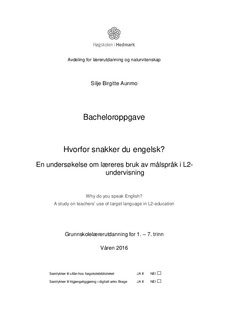Hvorfor snakker du engelsk? En undersøkelse om læreres bruk av målspråk i L2-undervisning.
Bachelor thesis

Åpne
Permanent lenke
http://hdl.handle.net/11250/2496116Utgivelsesdato
2016Metadata
Vis full innførselSammendrag
Norsk:
I 2015 kom det påstander om at lærere både kan og bruker for lite målspråk L2-undervisning. Parallelt gjorde jeg en erfaring ute i praksis som underbygget dette utsagnet. Tiden engelsklærere har til rådighet i klasserommet er tilmålt, og med det sosiokulturelle synet på språklæring lagt til grunn, så enes teorien om at barn best lærer språk ved eksponering. Med utgangspunkt i dette, utarbeidet jeg problemstillingen Bruker engelsklærere for lite målspråk i L2-undervisning, og i så fall, hvorfor? For å utdype dette, har jeg benyttet en blandet metodeform, bestående av et datainnsamlingsskjema med kvantitative og kvalitative spørsmål, samt intervjuer med tre lærere. Viktige funn jeg har gjort, er at det er stor variasjon i hva lærere oppgir som mye, tilstrekkelig eller lite bruk av målspråk, og at lærere tyr til bruk av L1 i det som oppgis som spesielt viktige situasjoner, hvor de må forsikre seg om at elevene forstår. Dette til tross for at lærerne trekker frem viktigheten av å fremstå som språklige rollemodeller for elevene. English:
In 2015 came allegations that implied that teachers both know and uses too little target language in L2-teaching. Parallel to this, I made an experience out in practice, which substantiated this statement. The time English teachers have at their disposal in the classroom is measured, and with the emphasizing of the socio-cultural view of language learning, the theory assents that children learn language best by exposure. Based on this, I prepared the issue Are English teachers’ use of the target language in their L2-teaching insufficient, and if, why? To elaborate this, I have used a mixed methodology, consisting of a data collection form with both quantitative and qualitative questions and interviews done with three teachers. My key findings are that there is considerable variation in what teachers provide as much, sufficiently or little use of the target language, and that teachers resort to the use of L1 in what is stated to be particularly important situations, where they must make sure that the pupils understand. This despite the fact that teachers highlights the importance of appearing as linguistic role models for pupils.
Beskrivelse
Bacheloroppgave, grunnskolelærerutdanning, 2016.